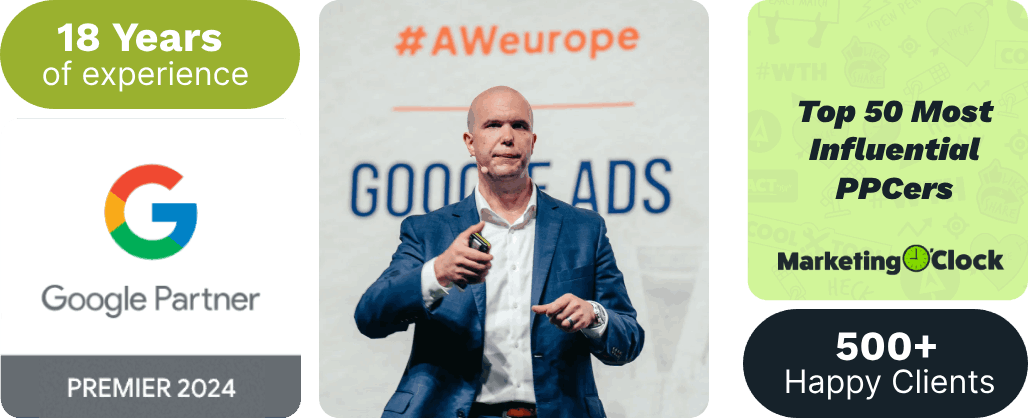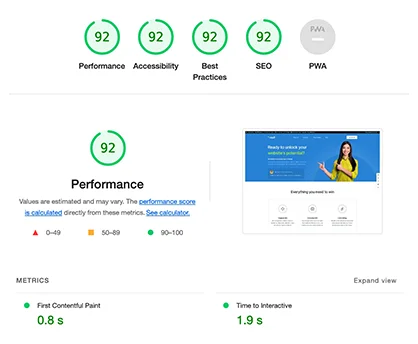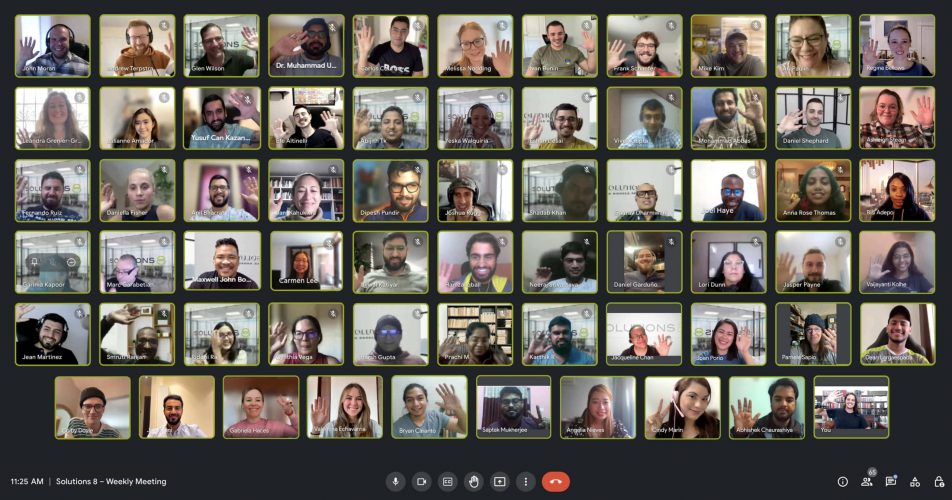We have a Solutions 8 newsflash! Google AI is here, and it might surprise you that it’s been here longer than you can imagine.
RIP Google Search, Generative AI Is Here And It’s Awesome!
Table of Contents
Comparing Organic Search with AI-Powered Search
How did AI determine what to draw from?
Ad placement in Generative AI Search
Everything about search is going to change
Google is more or less AI-powered and everything you’ve ever searched is the result of that. SGE is a generative AI search engine that brings AI-generated responses to a search bar near you. Using machine learning algorithms to understand your search queries, browsing history, and interests, Google can deliver more relevant search results.
Comparing Organic Search With AI-Powered Search

So, first, we are going to take a look at Google’s AI-injected search experience. Starting with Search Labs, simply opt into the Google Search Generative Experience, or SGE as it is otherwise known.
We’re going to take an in-depth look at a random question that anyone might ask: How long does it take to learn a new language? The standard UI is presented with a search bar at the top, which you’re used to, and with your filters, too, which you’re used to.
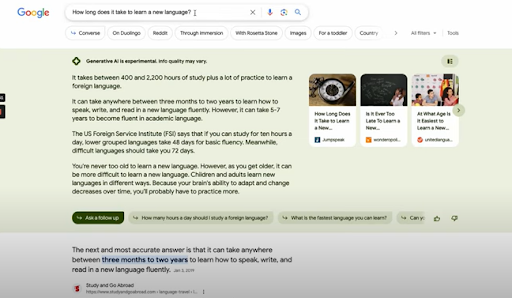
Google has injected this colored background for its generative AI and the colored background you’ll notice gets priority placement. Microsoft hasn’t done this. That’s the first difference.
While Microsoft’s Bing offers something similar for the same random question, it always remains a Microsoft search. There’s a chat snippet on the right-hand side, but primary real estate remains unencumbered.
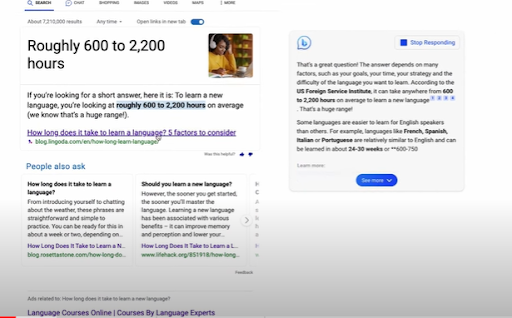
Interacting with Microsoft Chat takes us on another adventure. You’ll notice a couple of things about Microsoft’s chat. The first thing is their citations are in line, which looks really good. It’s a pretty elegant solution.
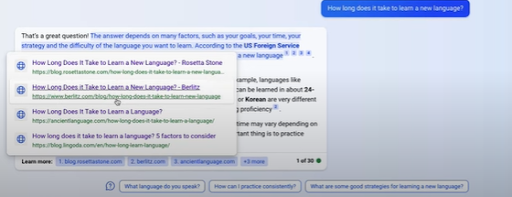
Microsoft’s Chat is not fully integrated into the search whereas Google’s AI seems to override the basic search, going as far as having different results altogether.
Google’s citations offer context as to where this information comes from. On some occasions, it offers two sources for specific information, and we at Solutions 8 like that very much since it shows us what generated that result.
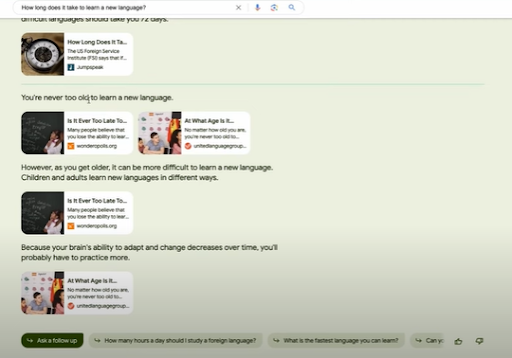
AI-generated searches will more than likely diminish the creation of unique quality content. This will be inevitable over time. Personal citations beat generic citations every time.
How Did AI Determine What To Draw From?
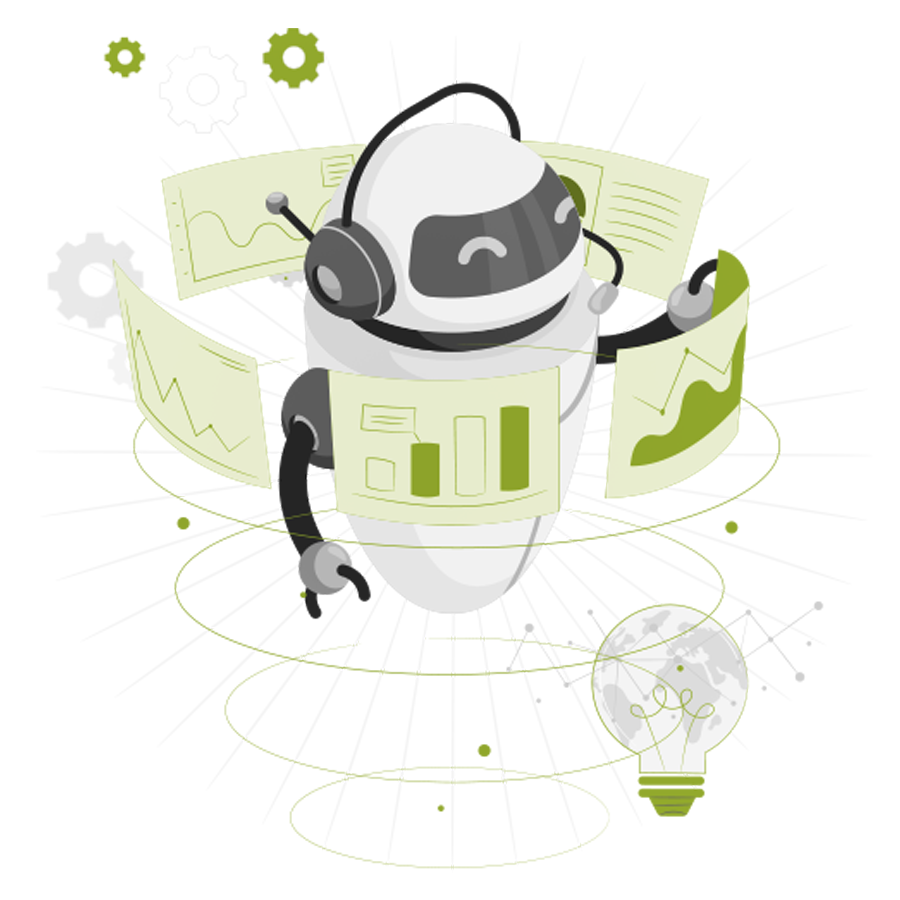
An interesting observation is that the first organic result is not cited by the AI. So we can surmise that AI has a different algorithm to the search algorithm. AI’s method of determination for relevance is different. RIP Google Search!
The first cited AI site is number five in the organic results.
If you’re number one organically, you can’t bank on being number one in the generative AI.
How did the AI determine what to draw from? If it’s not based on Google’s standard search algorithm, what is it based on?
There seems to be no obvious guideline as to how AI is pulling its results in. It appears purely random. It’s not based on reviews and it’s not based on proximity. Furthermore, it has actually used Google as its own citation.
Our business now becomes focused on how we show up in the AI results. And how valuable would that actually be? It’s not as valuable as being number one in the SEO which is much better than being cited in the AI results. We have the answer highlighted and it’s no longer necessary to go to the results.
Let’s see what happens with some follow-up questions.
- How many hours a day?
- What’s the fastest language you can learn?
This is where the chat experience begins. Clearly, there’s a change in formatting and we’re happy to report the content looks good. Generative AI is awesome!
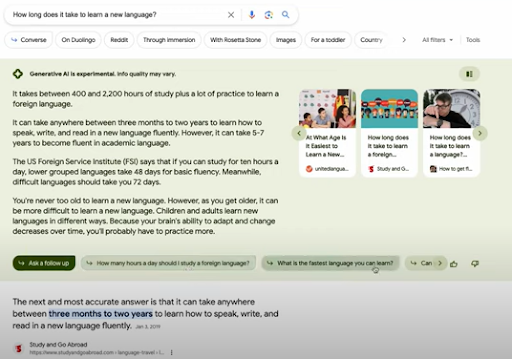
So, just how long does it take to learn a new language? It takes about 422 hours of study. That’s a real answer. It takes anywhere between three months to two years to learn how to speak, write, and read a new language.
An interesting development occurs here, which is that Google is not citing the source. They’re citing someone who’s citing someone, which is dangerous. One would assume Google wants source citations.
Take a look at the bullet point information.
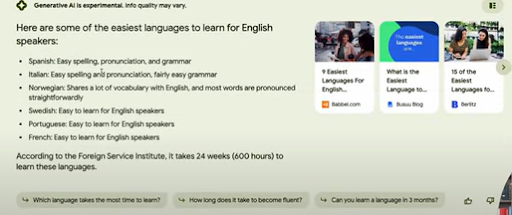
We’ve got a list of the easiest languages to learn for English speakers. It answers our question thoroughly, listing not only the various languages but why they’re the easiest. And for now, it continues to give search results.
This could eventually disappear or become an accordion display since there’s no way Google could keep this inside the chat experience. There’s simply not enough room for it all.
Ad Placement In Generative AI Search
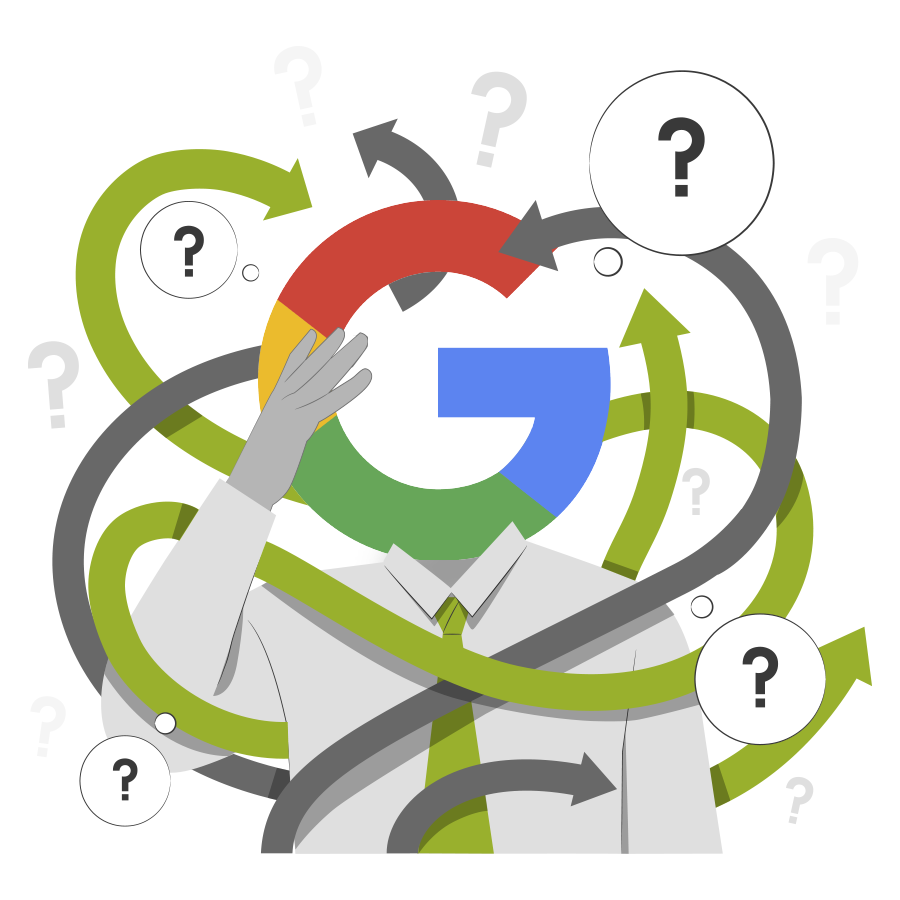
Expanding our search to include a commercial slant, we might add:
- What’s the best online Spanish class for the money?
Now this is where you would think the ads would pop up. If you’re Google, where would you put the ads?
Bing, for example, has links that are their citations. The first one is an ad and that’s how they are embedding their ads. Google could follow suit but there’s not much prominent ad space. It stands to reason that the citations become the ads.
If the citations become the ads, does that mean the content needs to be drawn from the citations? Does that mean to be a successful advertiser on Google you need to have high-quality content? Or will a whole new section of real estate be carved out for the ads?

There’s a good chance Google doesn’t know where to put its ads. Google would have to maintain continuity with the experience. Just a list of ads becomes banner blindness. Gmail has ads that look like mail and YouTube has ads that look like YouTube videos. Maintaining continuity is crucial to the experience.
There are lots of citations and this now becomes the ad. This is the most valuable real estate Google has ever had. At $500 per click, there is little chance they will bump that down below the fold and prioritize an organic result without monetization.
An AI-generated result couldn’t turn these into ads mainly because that would no longer be considered AI. It would just be an ad network. With one AI result, who knows how much that click is worth?
Everything About Search Is Going To Change
Further digging demonstrates there are still no ads showing up, and we’re back to an organic search once more. Single ad placement makes a lot of sense. Everything about search is going to change.

What we’re bidding on is going to change. How many competitors we have is going to change. The way people interface and interact is going to change.
A Final Observation
We can treat generative AI as a conversation, much like chat GPT. Instead of one search having multiple links that branch off into other links, this is one search that will catalyze conversation and have multiple discussions exclusively with Google. Interaction with Google is going to be where people stay.
Google basically owns browsing time and this changes everything. Stay tuned here to find out where Generative AI is going to take us. What a ride!
Author
Jani is a copywriter at Solutions 8 with a passion for short stories, dancing under the stars, and 80s pop music. Her soul’s purpose is to turn herself into a masterpiece. Her future is filled with green fields, flowers, sunshine, and poetry.
 Jani Kahukiwa
Jani Kahukiwa



